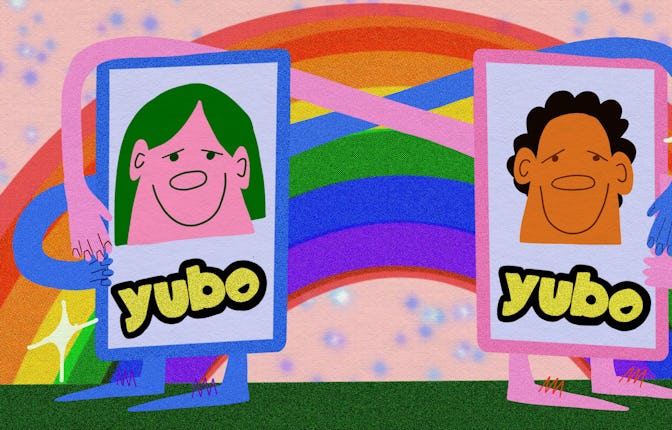How Yubo — the "Tinder for teens" — became a mental health haven
The app appears to be more about finding community than hookups.

When French social media platform Yubo started to rise in popularity worldwide, it was immediately steeped in controversy. Parents were — understandably — concerned that the app would subject young people to predators and bullying at a moment when we were only starting to realize how dangerous social media can be for young people. But, despite the initial resistance, the app doesn’t actually seem to be hurting teens. In fact, some Yubo users told me that it’s helping them better manage their emotional health.
If you’ve never used Yubo, here’s a quick overview. It’s an app where users — mostly aged 13 to 17 — can join live streamed video chats, make friends, and direct message each other.
Yes, you can join Yubo if you’re over 18 (hi!) but people who are 13-17 and those over 18 are put into two different communities that don’t interact. The security functions that keep the communities on Yubo separate use age recognition technology and image searches to make sure people are the age they say they are. While it might not work perfectly 100% of the time, their system a lot more stringent than any other social media app when it comes to protecting kids from adult predators.
So what’s the draw of Yubo for young users? Well, first of all, the age separation thing. I don’t know if you remember 13, but most teens don’t actually want to hang with 30-somethings. That means that the communities people form in the app are with their peers. “It’s a better and safer way to chat with others,” Tyler Tammons, a 21-year-old Yubo user in Illinois, tells me. To be transparent, because of my, er, advanced years that I actually couldn’t find any younger people on Yubo to talk to, so their communications team put me in touch with users.
For teens stuck in the middle of a pandemic that prevents travel, it can give them a way to meet people their age in other places. “You can meet people from all kinds of backgrounds across the world,” says Joyce Sukidi, an 18-year-old daycare aide in North Carolina. Because Yubo doesn’t have the “like” or “follower” functions of other apps, some people find it easier to make actual friends instead of amassing status points.
These online relationships can be really important to young people who are trying to learn how to navigate the complexity of relationships. “I've gotten so much more in tune with how to handle relationships with other people,” Sukidi tells me. She says that she’s learned a lot on Yubo about how to set healthy boundaries and that’s it’s helping her feel safer in relationships generally. “I opened a door that shows it’s okay to let people in even if they are miles away,” Sukidi says.
Secret, a 17-year-old genderqueer Yubo user who lives part of the year in Arizona and part in California, tells me that Yubo has been a great outlet for them when they want to connect with people when they’re having social anxiety. “Yubo can help you cope with certain things such as anxiety,” Secret says. “If you're scared to meet new people in person, you can meet them on Yubo instead.”
I ask Secret if they ever had a problem with misgendering or gender bias on Yubo. “Sometimes,” they tell me, “we call those people trolls.” Honestly, I’m not surprised. Yubo has more gender options than almost any other app. It’s known for being a safe haven for young LGBTQ+ folks, and queer influencer Thee Amir has written publicly about how he found community and acceptance on Yubo during lockdown.
Yubo also has safe peer support spaces for when people specifically want to talk about their mental health, but none of the users I talked to mentioned those. They seem more interested in the friends they’re making and the way those people support them. As Tammons tells me, “Yubo makes me feel more occupied and relaxed, and talking to my friends on Yubo can help make me laugh when I’m upset.” What more could anyone ask for out of a community?